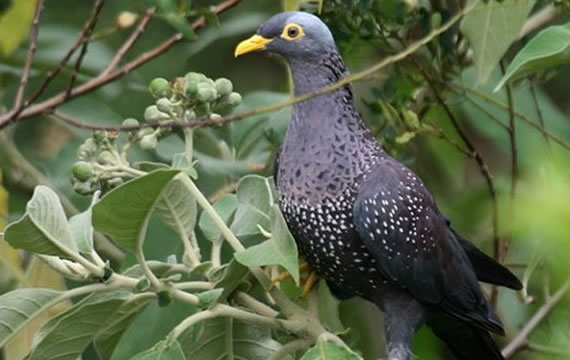This is the biggest pigeon in southern Africa, and is common in the Fern Forest. The “olive” part of the name is presumably linked to part of the diet, because the plumage is a deep purple, spotted white. Vivid yellow feet and beak complete the attire.

Normally very shy and difficult to see, at certain times of year ramerons gather in the clump of trees growing on the balcony near the bar. This clump was not deliberately planted, but grew up naturally around a long-dead ornamental tree. The original seeds were pooped out by birds perching in that tree, and reflect the favourite fruits eaten by those birds. Now events have come full circle with the best possible menu being offered to the most fussy guest. Ramerons overcome their retiring disposition to get at these fruits, completely ignoring hotel guests, because it’s important to grab fruits at peak ripeness. You snooze, you lose.

So lucky to spot one in my garden today..just now…sprayer was on and it was feeding on some food I put earlier out for birdies..so I searched for this new visitor in my garden….geelbekbosduif .. precious..
Hello Frieda
How lovely! They are gorgeous birds and they often feast in trees on our front deck.
Warm wishes,
Megan
Hey Frieda where do you live?
One was drinking water in my birdbath this morning and I was surprised, I have never ever seen a big pigeon like this, it was as big as a chicken and the yellow feet was HUGE. This made my day! Erasmuskloof, Pretoria.
Aren’t they the most beautiful birds, Heleen!
Lovely to have had such a great sighting.
Warm wishes,
Megan
We where sitting outside on the veranda in Helderkruin Roodepoort, and one came to drink water from a birdbath in our garden. Had to google it as I have never seen one before. Thank you for the post.
Many thanks, Andre.
Lovely birds!
Came across one today in my son’s garden in Irene..it was SO tame… sitting on a low branch of the tree..I almost felt it was going to sit on my shoulder..wondered if it had been rescued at some stage as it was so unafraid..my son has had the same experience with this one bird.
Loved reading your info.
Thanks for being in touch, Linda.
So pleased you enjoyed the read and wonderful to have seen one up close in Pretoria.
The African Olive-Pigeons here are a bit skittish so perhaps a rescue as you say.
Warm wishes,
Megan
Thank you, Carol for assisting me where Robert’s was a bit of a chellenge.
You never know when or by whom your posts will be read and appreciated.
So glad I could find a way to acknowledge your generous sharing of knowledge.
God Bless
Josie
Thanks for your interesting blog. This is to let you know that I cited your observation on the reason for the “olive” part of the name on my recent post on the Rameron/African Olive-Pigeon on the blog “letting nature back in: nature and nurture in suburban spaces”. Thank you for this insight. You can find my post at naturebackin.com
WIth best wishes
Carol